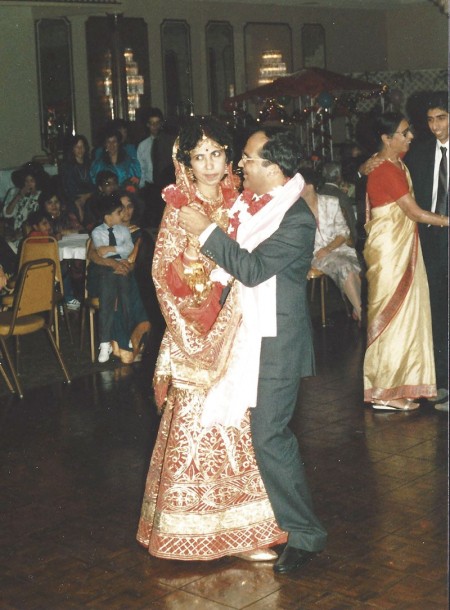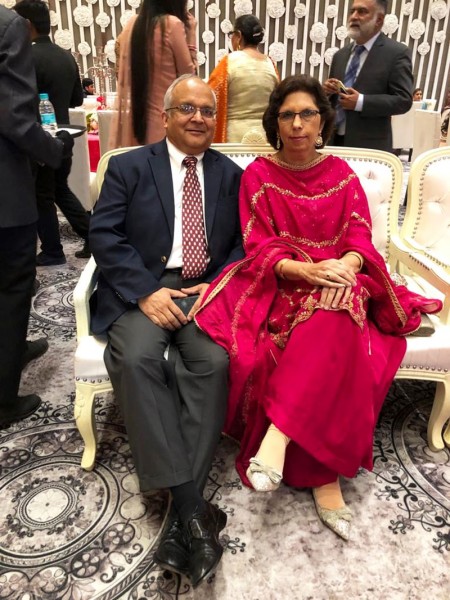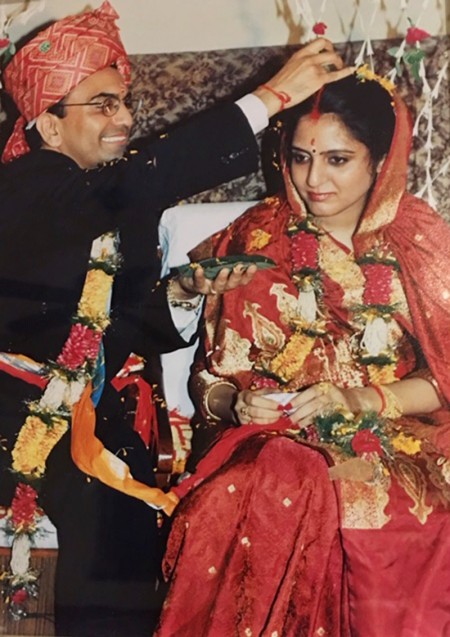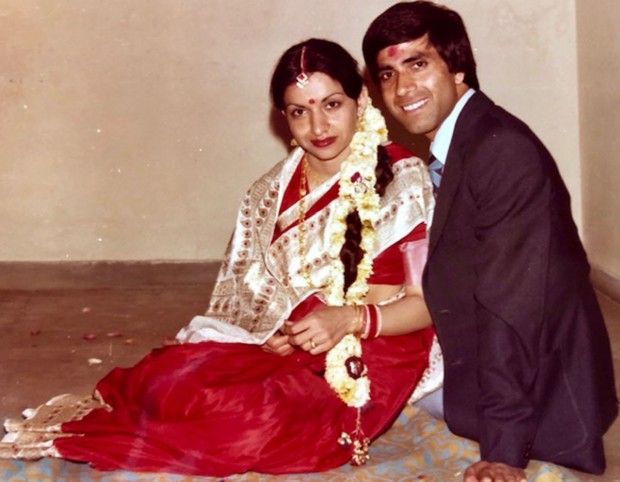First Comes Marriage, then Comes Love: A Look at Arranged Marriages

Imagine meeting your future life partner only once before your wedding day. It may sound imprudent, even insane. But, for my parents and some other Buzz residents of Indian backgrounds, this was simply their reality.
“Is marriage the culmination of romance or the beginning of romance?” My dad, Atul Salhotra, posed this question when I started probing him on the details of his arranged marriage. “I debated this topic and won when I was in graduate school,” he added, rather proudly. You can probably guess that my dad believes that marriage is just the first step in getting to know and fall in love with your life partner.
“I think love grows,” my dad said.
My dad was almost done with his PhD at MIT in the late '80s when his parents — from all the way in India — began pressuring him to find a wife. Once he landed an engineering job in California, his parents came to visit him for a three-month period, during which they placed a matrimonial ad in India Abroad, a weekly publication targeted towards Indian-Americans. Meanwhile, my mom, Poonam, was across the country in New York City, completing her own PhD at Weill Cornell Medical School. She too was facing marital pressure from her parents, who also placed a matrimonial ad for their daughter in the same newspaper. (This newspaper is still around today, and you can find samples of matrimonial ads here).
“My mom would actually look through the ads and circle the ones she thought were good,” my mom told me.
Unbeknownst to my mom, her parents responded to my dad’s parents’ ad in the paper. So, in the spring of 1987, my dad trekked all the way to Buffalo to meet my mom for the first time. “I had gotten a letter from my parents saying to go meet this girl,” my dad said.
In the tiny town of Gowanda in upstate New York where my mom grew up, my dad spent the day with my mom and her family. They ate lunch together, went to the local Indian grocery store and watched a Bollywood movie. But, over the course of the day, the future couple spent zero alone-time together.
Though my mom soon forgot about this meeting — she said many of these initial meetings led nowhere — my mom’s family received a letter from my dad’s parents a few months later. The letter indicated his parents were interested in meeting her parents. So, in June of the same year, my dad again traveled across the country, while his parents traveled from India, to meet my mom and her parents in my mom’s tiny NYC apartment.
“We had breakfast together, and everyone was sort of just sitting around talking,” my mom recalled. “There wasn’t any one-on-one time.”
After some back-and-forth between the parents, it was soon decided that Atul and Poonam would get married. My parents consented to the marriage, but neither was thrilled about it either. How could they be? They hardly knew each other.
“I was kind of indifferent,” my mom said. “He seemed like a good person, I was excited about MIT.” How romantic, I think.
Although my mom wanted to hold off on the wedding until the following May, when she would graduate, my dad’s family wanted it done earlier in order to avoid repeated travel between India and the U.S. My mom ultimately agreed to an October wedding date, and wedding preparations soon began. All the while, my mom was waiting for her diamond ring.
“There’s the American side of me saying, ‘I need a diamond ring,’” my mom said. “And he’s like, ‘just go pick something out.’” Even now, my mom jokes that she had to go get her own ring.
Even though my parents had to spend the first several months of marriage getting to know each other’s quirks – what bothered the other and what they would compromise on - my parents agree that the arranged marriage system is a good one. Both emphasized the benefit of having your parents, who ultimately care deeply about your well-being, search for your potential life partner.
“Even in this day and age, arranged [marriage] - in that your parents or family members help you find someone - is actually good,” my mom said. “Honestly, nobody knows you better than your parents.”
Rakesh and Seema Mangal, Buzz residents who had a quasi-arranged marriage themselves, agree with this sentiment. “Your friends and parents aren’t going to send you just anybody,” Rakesh said. “It’s kind of like everything is screened out.”
The more I heard about the arranged marriage concept, the more it reminded me of today’s world of dating apps (albeit an archaic version). Instead of having our parents or family-friends filter through profiles and conduct background research on potential matches, we now do this for ourselves – reading through our match’s profiles on our phones and stalking our potential dates on social media.
For Rakesh, arranged marriage allowed him, a doctor living in Louisiana, to connect with a teacher living in Calcutta, India in 1997.
Like my parents, Rakesh felt significant parental pressure to get married.
“As soon as I started med school, my mom started sending pictures [of potential matches]. In India, my grandfather and friends all started looking.”
But Rakesh was not interested in marriage. He wanted to finish medical school before settling down. He even pushed his younger brother to get married before him in order to detract attention from himself. Rakesh’s younger brother, an engineer, agreed to have an arranged marriage. “Then the pressure was off,” Rakesh said. “It was a big relief for me.”
But relief didn’t last long. When Rakesh started residency, his mom cracked down again. “Any holiday I came home, my mom would be there with pictures,” he said. “I can’t tell you how many I saw.”
Though Rakesh wanted to please his parents and stay connected to his roots by marrying a woman from India, he was determined to first finish residency. But once residency was finished, he wanted to complete his fellowship in Ob/Gyn, followed by another fellowship in surgery. At that point, his mother was worried about her son’s marital future. While they were attending a friend’s Indian function in Mississippi - where Rakesh grew up - his mother approached a priest about Rakesh’s situation. The priest, who read Rakesh’s palm and offered predictions based on astrology, said that Rakesh was a “Shani,” an astrological sign associated with the planet Saturn.
According to Hindu tradition, each day of the week is associated with a planet and a God. Saturday is associated with Saturn as well as with the God Hanuman, the God of strength. According to the priest, Rakesh would need to fast for three consecutive Saturdays after which he would meet his future wife.
“I said yeah, right,” Rakesh remembered. “But I said I’d go along with my mom.” So, Rakesh, though skeptical, obliged and fasted for the next three Saturdays, even while on a vacation in East Asia with his friends for two out of the three Saturdays.
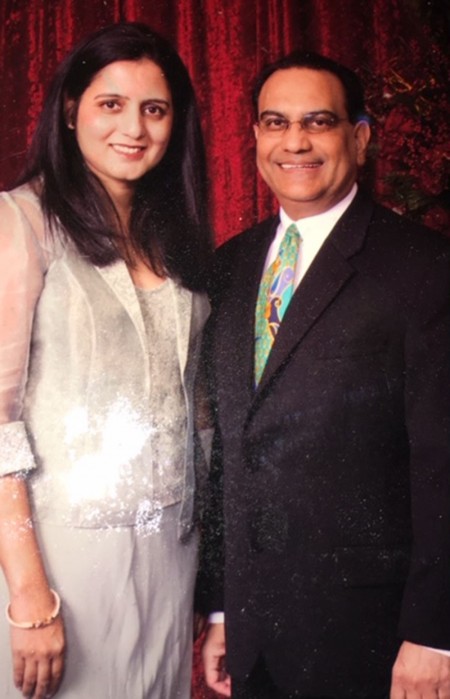
Seema and Rakesh Mangal met through family-friends and decided to get married after meeting in person and talking on the phone every day for months.
Sure enough, the Tuesday after his last fast, Rakesh found his soulmate.
Having just returned from his two-week vacation, Rakesh went to check his mailbox. Unsurprisingly, his mailbox was stuffed with envelopes with photographs of potential matches, sent by his parents, extended family and family-friends. While pulling out the envelopes, one fell to the ground. In a hurry to get to work, Rakesh stuffed all the envelopes back in the mailbox, except the one that had fallen on the floor.
When he opened it, Rakesh first saw a statue of the lord Hanuman – this shocked Rakesh, since Tuesday is also associated with this God. And in front of the statue was a beautiful woman, Seema.
“I just got the chills,” Rakesh said. “And as soon as I saw the picture, there was no question in my mind. I had to meet her.”
Rakesh and Seema began talking on the phone and finally had a chance to meet about three months later when Rakesh travelled to India. Both said they were struck by how easy conversation was.
“We were just talking and talking and couldn’t stop,” Rakesh said. “I don’t know where the time disappeared.”
After meeting, both Seema and Rakesh were ready to say “I do,” but they wanted to move slowly through the process.
“We didn’t make any decision at that time,” Seema said. “We were both ready, but we didn’t want to do anything under pressure; we wanted to take our time and see how we felt about it.”
The two continued to talk on the phone for several months, with Rakesh spending $1.50 per minute to make the long-distance phone call from Louisiana. Finally, on July 4, he proposed to Seema over the phone. “I said how about it, and she said yes. Or actually she said okay,” Rakesh corrected himself, chuckling.
Within 10 days of the proposal, Rakesh and Seema got married in India. But because of complications with Seema’s visa, they spent the next 12 months in two different countries. During that time, the couple had three separate honeymoons: one in India, when they stayed in a hotel facing the Taj Mahal, one in France, when they stayed at a Hilton with views of the Eiffel Tower and one in Switzerland.
“It was actually the best thing that happened because it gave us a chance to get to know each other,” Seema said of the visa delays.
Although Seema and Rakesh had autonomy over their marriage decision, they still consider it “arranged” and say the system can work well if done correctly.
“We wouldn’t have known how to meet with 1000 miles between us,” Rakesh said. “Our families got us together and then it was left up to us to meet and talk.”
“I think [arranged marriage] is not bad if you don’t force it,” Seema added.
Reeta Mehta, another Buzz resident who married in India, agrees, even though she opted for a “love marriage” herself. Reeta met her husband, Kapil, a fellow student in her PhD program in India in the late ’70s. She had spent years ignoring requests from her mom to have an arranged marriage. Her mom had previously invited potential matches over to the house. Reeta recalls having to serve tea to those men and their families and being expected to act in a particular way. But she didn’t like this expectation. She wanted to find her husband herself.
“I was a feminist even back then,” Reeta said.
Reeta and Kapil dated for several months while they were students, before they decided to get married. Still, Reeta said she thinks today’s dating culture, where people often date for years before thinking about marriage, can present complications.
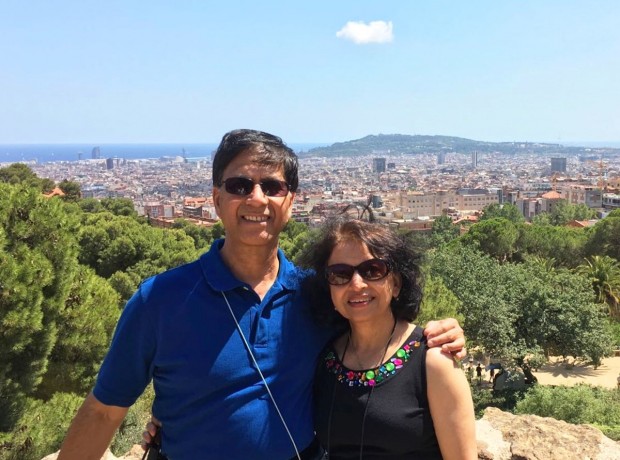
Kapil and Reeta Mehta snap a photo at the top of Gaudí’s Park Güell in Barcelona Spain in the summer of 2017.
“I think it’s good that you get to know each other very well, but if you go too far and then realize you don’t like the person and then have to start all over again with a new person, how many times will you start over?” she said. “The thing is, you have to adjust in any marriage. Nobody is perfect.”
Susheela Denduluri, a Buzz resident who had an arranged marriage in the early ’70s in India, echoed this sentiment.
Susheela grew up in a small town in India, at a time when matrimonial ads and dating apps did not exist. Her next-door neighbors were related to her future husband and suggested the potential match. Her future husband, Ramarao, along with his parents, came over to meet Susheela’s family at her home one day when Susheela was only 16 years old. Two days later, it was decided they would get married.
“I was too young to decide anything at that time,” Susheela said, noting her parents made the decision for her. “We didn’t have that much discussion about it.” Because the families were connected through their neighbor, everyone was confident the match was a good one.
Susheela said 16 was too young to marry and noted that she sees value in dating and getting to know someone. But, she said, at the end of the day, regardless of whether you meet through an ad, an app or through your parents, it’s ultimately all about being willing to make the relationship work.
“Any way [you meet], once you get married, you have to adjust. I may not like something he does, and he might not like what I do. But finally, you just have to compromise and keep going.”
Want more buzz like this? Sign up for our Morning Buzz emails.
To leave a comment, please log in or create an account with The Buzz Magazines, Disqus, Facebook, or Twitter. Or you may post as a guest.


